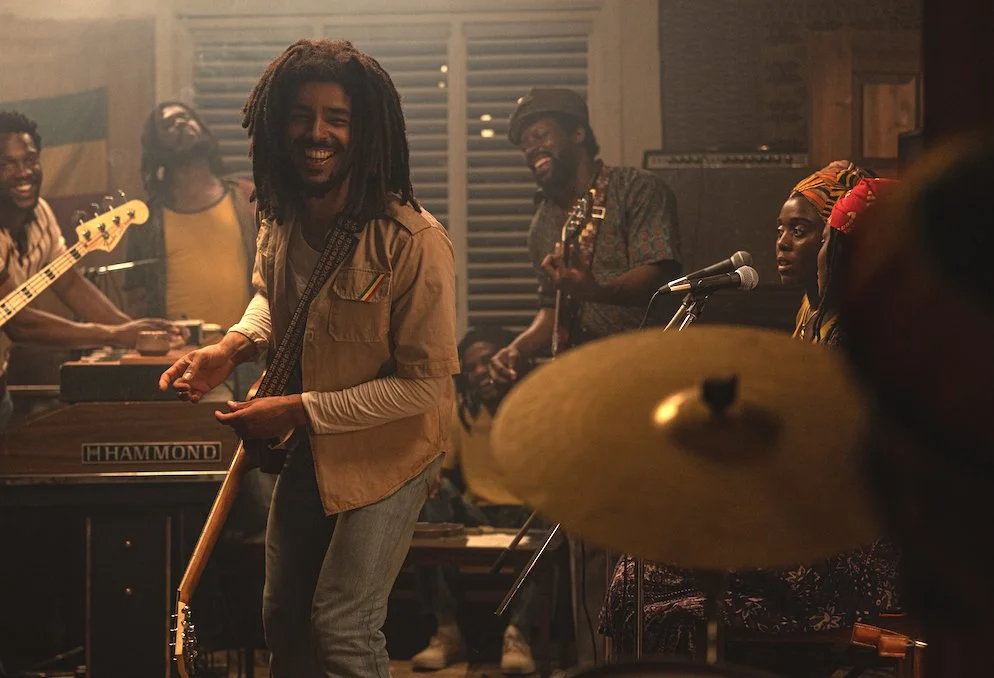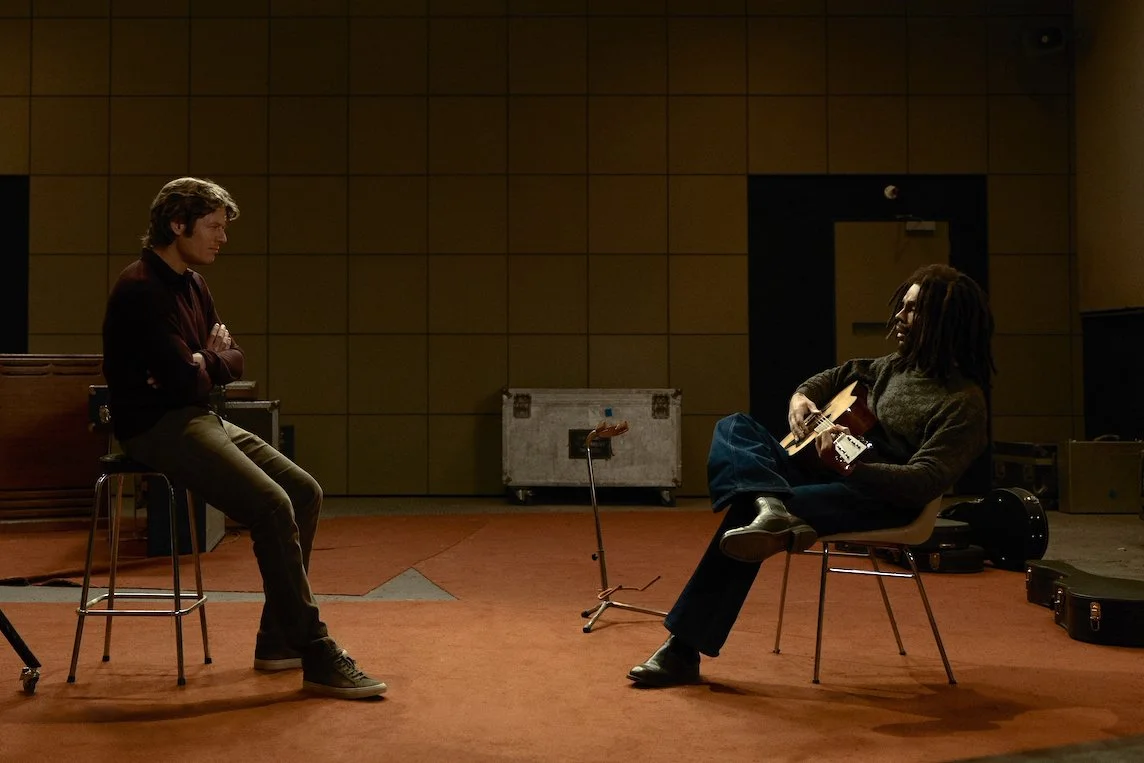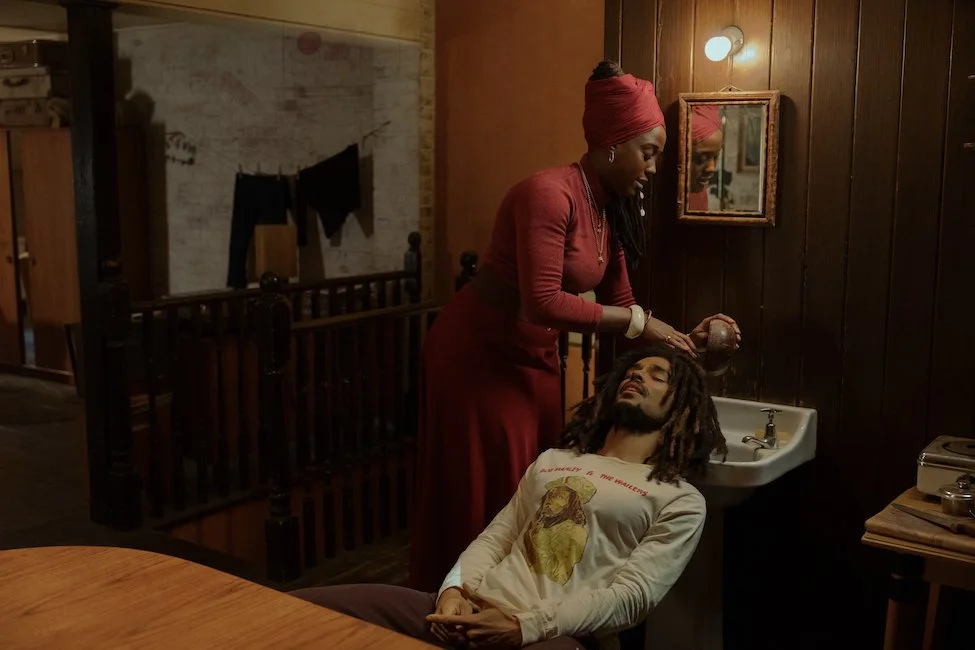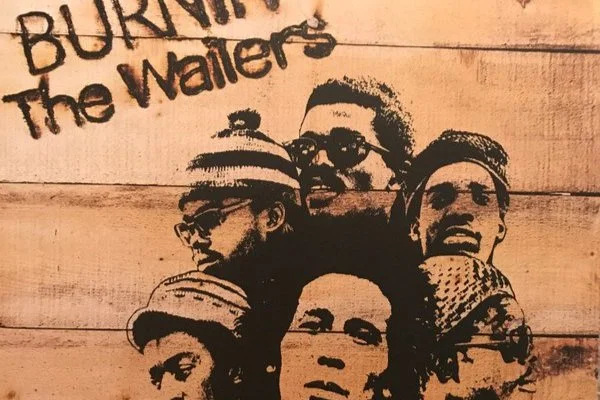Lost ‘Love’
Even a fiery subject like Bob Marley can’t find a way to transcend biopic convention.
Bob Marley: One Love
Director: Reinaldo Marcus Green • Writers: Terence Winter, Frank E Flowers, Zach Baylin, Reinaldo Marcus Green
Starring: Kingsley Ben-Adir, Lashana Lynch, James Norton, Anthony Welsh, Tosin Cole, Michael Ward
USA • 1hr 47mins
Opens Hong Kong March 14 • IIB
Grade: C+
One thing King Richard director Reinaldo Marcus Green got right when taking on this biopic of legendary reggae musician Bob Marley was in not biting off more than he could chew. By now most of us are inured, immune, indifferent or all of the above to the cadences of the biopic: disadvantaged childhood, humble origins, discovery, fame, fame gone to their head, isolation of and from friends and/or bandmates, drug and/or alcohol-greased crash, artistic rebirth and redemption. Usually death. It’s Elvis, Ray, Walk the Line, Respect, Bohemian Rhapsody… So in focusing on a single short passage, a sliver in a massively influential and paradigm shifting career, Bob Marley: One Love wins points for zeroing in on a singular moment in his life. It’s more All is By My Side (about Jimi Hendrix) and My Week with Marilyn (Marilyn Monroe) than standard biopic.
Thing is, Marlon James already did this better in A Brief History of Seven Killings. If you’re curious about Marley, who died of a rare cancer in 1981 at just 36, and the political upheaval in Jamaica of the mid-1970s, read that, ideally with Legend playing in the background, because unfortunately One Love does feel like a rote biopic in the end. It never touches on how the music was the message for Marley, and how that made the personal political. And it’s a low-energy one at that. This is Bob Fuckin’ Marley we’re talking about. This should be a sing-along.
One Love essentially tracks the writing and recording of Bob Marley & the Wailers’ seminal 1977 album Exodus, in London, where Marley (Kingsley Ben-Adir, Barbie, One Night in Miami) fled to after an assassination attempt at home in Kingston. When the film begins, he’s already an influential superstar and the world’s most famous Rasta. But he’s shot ahead of his planned Smile Jamaica concert, an event he’d hoped would unite the freshly independent nation and quell the spreading violence. He brushed it off, but the attempt on his life shook him up, and he went into a kind of exile. That created even more turmoil. Marley’s wife Rita (fabulous and luminous as always, Lashana Lynch, No Time to Die, The Woman King) was also shot, and after a short stint with her mother joins him in the UK, and she proves to be the final piece of the puzzle that gives birth to the album. Now, it’s a biopic, and there are boxes to tick so we have: squirrelly manager Don Taylor (Anthony Welsh); words of, I don’t know, supportive wisdom from Island Records mogul Chris Blackwell (James Norton, Little Women); “cameos” by fellow reggae star Peter Tosh, The Clash’s Joe Strummer and Mick Jagger (it was the ’70s, Jagger was everywhere); and the obligatory montage of chart positions and dazzling fame. And weed. Lots of weed.
Ben-Adir, who mostly nails Marley’s irresistible charisma, and Lynch, fortunately, do their level best with the script by Terence Winter, Frank E Flowers, Zach Baylin and Green, one that never really dives into the factors that could have made the film more revelatory. Wisely, Green and his writers don’t try and deify Marley; there’s plenty of room to suggest his philandering (he had 11 kids, not all Rita’s) and the sometimes fractious yet always committed relationship between him and Rita, whose own stunted ambitions are addressed in a standout scene after the Wailers’ last show in Europe. This is a Jamaican woman all over and Lynch nails why you don’t fuck with them.
But it’s one very brief peek into their dynamic. Like Bohemian Rhapsody was produced by the surviving members of Queen, One Love’s producers include Marley’s kids – Ziggy, Cedella – and Rita. There’s not so much room for a peek at Marley’s exacting musical standards, which may have led to Tosh and Bunny Wailer leaving the band, or of the less savoury parts of Rastafari culture (it’s traditionally patriarchal, proudly so). Criminally, the “live” music uses album tracks, which have great nostalgia value – the kids will be all, “Oh, that’s Bob Marley?” – but sadly give Ben-Adir’s performance a flat karaoke vibe. But most of all One Love never truly captures what made Marley such a beacon of hope and unity when a nation – and the world – needed one so badly. Maybe it never could have. But hey, I could be wrong. US$170 million in box office so far says I am. — DEK
the other Essential Marleys
We all know “Jamming”, “Three Little Birds” and “Buffalo Soldier” – for good reason – but these deep(er) cuts are The Wailers at their political, sexy, angry best.
“Trenchtown Rock” from Live! (1975)
“No Woman, No Cry” may be the definitive track from GOAT live record but Marley’s ode to music and his home is a stone sing-along classic.
“Midnight Ravers” from Catch a Fire (1973)
If you want a peek at how Marley got himself 11 kids, take a listen to this sultry escape – that also suggests rebellion against Babylon.
“Burnin’ and Lootin’” from Burnin’ (1973)
As overt in its raised fist as “Midnight Ravers” is covert, this ode to resistors of oppression is a global anthem for a reason.






